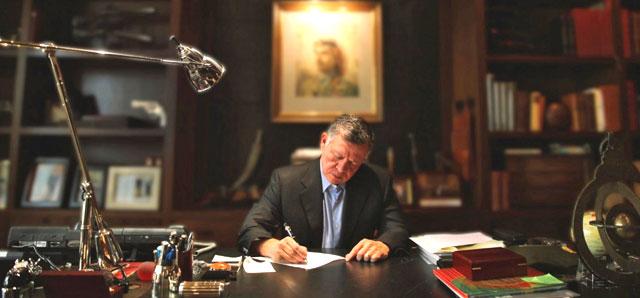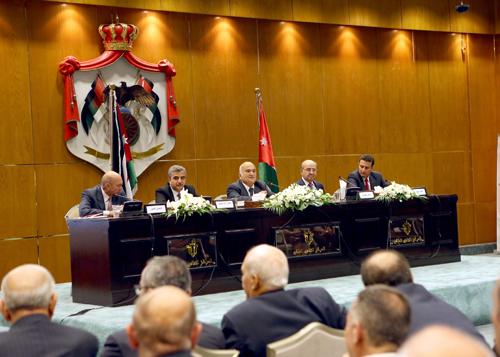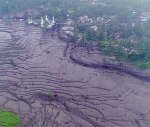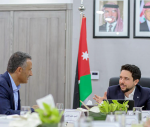You are here
His Majesty outlines approach to further enroot democratic principles in public life
By JT - Sep 13,2014 - Last updated at Sep 13,2014

AMMAN — His Majesty King Abdullah said that Jordan has showed resilience in the face of unprecedented regional volatility, yet the political reform process has continued.
In his fifth discussion paper, a series he launched in December 2012, the King said the document, entitled “Goals, Achievements and Conventions: Pillars for Deepening Our Democratic Transition”, is dedicated to reflect on “what has been achieved towards our goal of a vibrant Jordanian democracy since my last discussion paper in June 2013” (see full text).
The papers are meant as a contribution to the national debate on reforms in the Kingdom.
In the first four papers, His Majesty noted, “I outlined our vision for reform with an end goal of building a vibrant Jordanian democracy founded on three pillars: a gradual deepening of parliamentary government under the umbrella of our Constitutional Monarchy, underpinned by active public participation or what I called ‘active citizenship’.”
In a post on the Royal Court’s Facebook page, the Monarch said: “Today, although parts of our region have fallen as a victim of sectarian conflict, terrorism and extremist thought, which means that an entire generation has been hijacked, I still believe that our Jordanian evolutionary home-grown reform process, which ensures the engagement of all citizens in building their future, is the best and most consistence and sustainable choice to defend our country against the chaos around us.”
He voiced hope that all parties engaged in politics would embrace democratic practices and values outlined in the paper as they assume their roles in society.
His Majesty reiterated in the paper that the goal for Jordan’s home-grown reform is clear: empowering people to take the widest role in decision making through their elected representatives. “Deepening our democracy, therefore, translates into deepening our experience of parliamentary governments under our Constitutional Monarchy, reaching an advanced stage where a party-based majority bloc or coalition of blocs forms a government and the remaining minority serves as a shadow government, which would monitor, hold governments to account, offer competing programmes and guarantee democratic rotation of governments.”
“Through this fifth discussion paper, I aim to take stock of the milestones we have already achieved on three parallel tracks. I will also discuss the milestones ahead, particularly the values, practices, roles and conventions that need to continue to evolve in order to sustain the momentum of our reform model and reach our end goal successfully in a manner that is responsive to our citizens.”
The first of the three tracks is legislation, which has seen a major achievement embodied in a revised Constitution has been endorsed, thereby strengthening the separation of powers, along with a package of new political laws that was passed for the first election cycle after the constitutional revision – including laws related to elections, political parties and public gatherings. The third achievement in this domain is the new State Security Court Law, the King said, which has been enacted to limit the court’s jurisdiction to treason, espionage, terrorism, drugs and currency counterfeiting, and ensures that civilians stand trial only in front of a civilian court.
The King also underlined the new House’s by-laws as a milestone achievement in legislative reforms.
Institutional milestones, meanwhile, include the establishment of the Constitutional Court, Independent Elections Commission, whose mandate has been expanded recently, the research centre established under the Lower House of Representatives, measures taken to strengthen the judiciary and enhance the national system for integrity, transparency and accountability, support extended to the National Centre for Human Rights, public sector reform plans, and “important reforms [that] are under way among our national security agencies. The process started back in 2011 when I publicly entrusted the director of intelligence department with the task of reforming this vital national security body. Most significantly, the government is in the process of strengthening the role of the Ministry of Defence, which will be responsible for all non-combat defence matters and operations as part of government under parliamentary oversight”.
The third set of “milestones” involves “actors in our political system”, targeted by efforts to entrench a genuine culture of democracy and citizen participation, coupled with roles of key democratic stakeholders.
The King said that the values needed for successful democratic transition to parliamentary governments are now familiar to Jordanians and must be enrooted in the local culture and society. These values include moderation, tolerance, openness, pluralism, inclusiveness, respect and concern for others, respecting the rule of law and protecting the inalienable rights of every citizen, and guaranteeing that participating political platforms get an equal chance to compete at the ballot boxes.
The King added that the “Jordanian Spring” must also continue to adopt essential democratic practices, including respect for and embracing dialogue, accepting the reciprocity of rights and responsibilities as citizens, accepting that shared sacrifices lead to shared gains, turning disagreement into finding compromise, while maintaining constant dialogue, and active and constructive participation by all citizens.
“Stakeholders in our political system — the Monarchy, MPs, government, political parties and citizens — must internalise and apply these values and practices in playing their national roles and exercising their responsibilities.”
His Majesty then outlined the roles and responsibilities of stakeholders, including the Hashemite Monarchy, which should provide unifying leadership for all Jordanians and remain forward looking to ensure the prosperity not just of the current generation, but of future generations as well.
“As Head of State and Commander-in-Chief of the Armed Forces, the King is responsible for paramount issues of foreign policy and national security, and for protecting Jordan’s social fabric and religious heritage, acting through the Council of Ministers, which has the Constitutional responsibility to administer state affairs. The Monarchy is also the guarantor of the Constitution and the guard of neutrality, stability and justice, which intervenes to break deadlocks between parliaments and governments when they arise.”
The King highlighted the achievements made under the Youth Empowerment Window, established by Demoqrati, a democratisation and youth-empowerment initiative launched in June last year under King Abdullah II Fund for Development.
He cited, with details, Jordanian youths working on projects designed to promote democratic principles and standards and introduce concepts of platforms, campaigning, an ethical code of conduct and safeguards for clean elections.
His Majesty noted that Demoqrati will shortly launch an “equally important new initiative, Akeed, in partnership with the Jordan Media Institute”.
By helping to check and verify news reports concerning government and elected politicians in popular media outlets from newspapers to websites, Akeed is designed to help citizens become fully and accurately informed about issues that matter to them.
Looking ahead, the King set more goals to achieve, including improvement to key political laws, public sector and civil service development, a more active role of political parties, building the capacity of the judiciary, and a greater role for civil society organisations, including universities and think tanks.
King Abdullah defines “conventions” as a set of habits and practices that govern political actors’ conduct.
“Although conventions represent habits and practices that are not written down and may not have the force of law, they are vital for the effective and practical functioning of our political system. “Government, Parliament and the civil service must, therefore, develop the conventions that already exist and build new ones as new changes and challenges arise.” Examples include the consultative mechanism for designating prime ministers, the mechanism for formulating the PM-designate and his Cabinet’s four-year policy plan.
Another mechanism is to regulate “question-and-answer sessions from Parliament to government ministers, in a manner that upholds principles of transparency and accountability, and the government’s right to govern without threatening a no-confidence vote or calling for an enquiry whenever MPs are displeased with a decision because it contradicts shortsighted personal or group interests”.
“Let me conclude by reiterating that security, democracy and prosperity reinforce each other as the foundations for our future. Current regional challenges represent an exceptionally pressing situation. Our firm political development path is now well under way; but our economy, with the strains it is facing, requires our full attention.”
Related Articles
Following is the full text of His Majesty King Abdullah's fifth Discussion Paper as published in English by the Royal Court on Saturday.
His Majesty King Abdullah’s fifth discussion paper dispels all doubts about progress of reform amidst a turbulent region and is a call on all stakeholders to exercise their roles towards desired reform, political analysts, journalists and professional association officials said Sunday.
AMMAN — The Arab Thought Forum (ATF) on Tuesday issued a publication compiling its dialogue sessions of the Royal discussion papers authored













